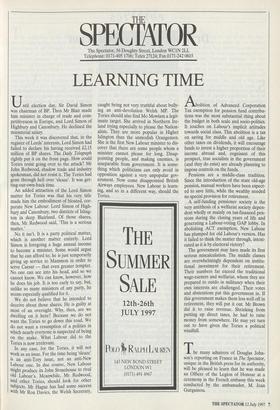The Spectator, 56 Doughty Street, London WC1N 2LL Telephone: 0171-405
1706; Telex 27124; Fax 0171-242 0603
LEARNING TIME
Until election day, Sir David Simon was chairman of BP. Then Mr Blair made him minister in charge of trade and com- petitiveness in Europe, and Lord Simon of Highbury and Canonbury. He declined the ministerial salary.
This week it was discovered that, in the register of Lords' interests, Lord Simon had failed to declare his having received £2.15 million of BP shares. The Daily Telegraph rightly put it on the front page. How could Tories resist going over to the attack? Mr John Redwood, shadow trade and industry spokesman, did not resist it. The Tories had gone through hell over 'sleaze'. It was get- ting-our-own-back time.
An added attraction of the Lord Simon matter for Tories was that his very title made him the embodiment of bloated, cor- porate New Labour: Lord Simon of High- bury and Canonbury, two districts of Isling- ton in deep Blairland. Of those shares, then, Mr Redwood said, 'This is a serious matter.'
No it isn't. It is a party political matter, which is another matter entirely. Lord Simon is foregoing a huge annual income to become a minister. Some would argue that he can afford to; he is just temporarily giving up service to Mammon in order to serve Caesar — that even greater tempter. No one can see into his head, and so we cannot know. We can know, however, how he does his job. It is too early to say, but, unlike so many ministers of any party, he seems especially qualified for it. We do not believe that he intended to deceive about those shares. He is guilty at most of an oversight. Why, then, are we dwelling on it here? Because we do not want the Tories to go down this road. We do not want a resumption of a politics in which nearly everyone is suspected of being on the make. What Labour did to the Tories is now irrelevant.
In any case, for the Tories, it will not work as an issue. For the time being 'sleaze' is an anti-Tory issue, not an anti-New Labour one. In due course, New Labour might produce its John Stonehouse to rival old Labour's. Meanwhile, Mr Redwood, and other Tories, should look for other subjects. Mr Hague has had some success With Mr Ron Davies, the Welsh Secretary, caught being not very truthful about bully- ing an anti-devolution Welsh MP. The Tories should also find Mo Mowlam a legit- imate target. She arrived in Northern Ire- land trying especially to please the Nation- alists. They are more popular in Higher Islington than the unmodish Orangemen. She is the first New Labour minister to dis- cover that there are some people whom a minister cannot please for long. Disap- pointing people, and making enemies, is inseparable from government. It is some- thing which politicians can only avoid in opposition against a very unpopular gov- ernment. Now come disappointed British Airways employees. New Labour is learn- ing, and so in a different way, should the Tories. Abolition of Advanced Corporation Tax exemption for pension fund contribu- tions was the most substantial thing about the budget in both scale and socio-politics. It touches on Labour's implicit attitudes towards social class. This abolition is a tax on saving for middle and old age. Like other taxes on dividends, it will encourage funds to invest a higher proportion of their income abroad and, cognisant of this prospect, true socialists in the government (and they do exist) are already planning to impose controls on the funds.
Pensions are a middle-class tradition. Since the introduction of the state old-age pension, manual workers have been expect- ed to save little, while the wealthy needed no special provision for retirement.
A self-funding pensioner society is the very antithesis of a welfarist society depen- dent wholly or mainly on tax-financed pen- sions during the closing years of life and generating a Labour-voting OAP lobby. In abolishing ACT exemption, New Labour has plumped for old Labour's version. Has it failed to think the matter through, intoxi- cated as it is by electoral victory?
The government may have made its first serious miscalculation. The middle classes are overwhelmingly dependent on institu- tional investment for their retirement. Their numbers far exceed the traditional wage-earners and welfariat, whom they are prepared to outdo in militancy when their own interests are challenged. Their votes and abstentions put this government in. If this government makes them less well off in retirement, they will put it out. Mr Brown did it to raise revenue. Shrinking from putting up direct taxes, he had to raise money from somewhere. He may yet turn out to have given the Tories a political windfall.
The many admirers of Douglas John- son's reporting on France in The Spectator, unique in the British press for its authority, will be pleased to learn that he was made an Officer of the Legion of Honour at a ceremony in the French embassy this week conducted by the ambassador, M. Jean Gueguinou.


























































 Previous page
Previous page